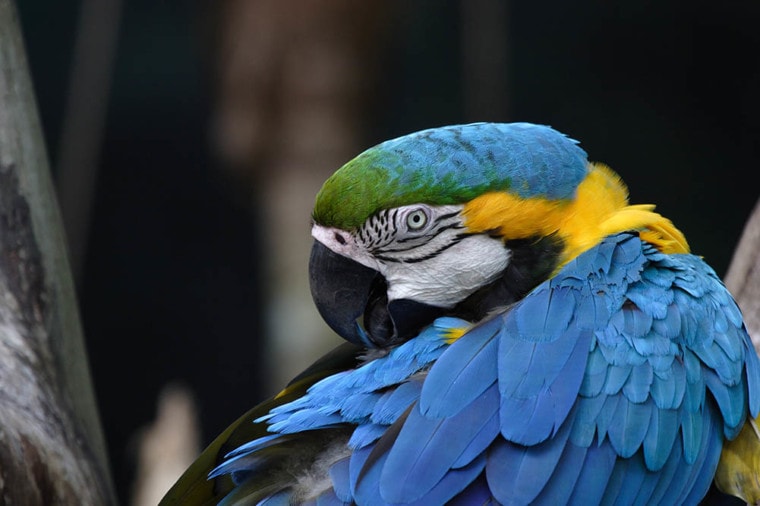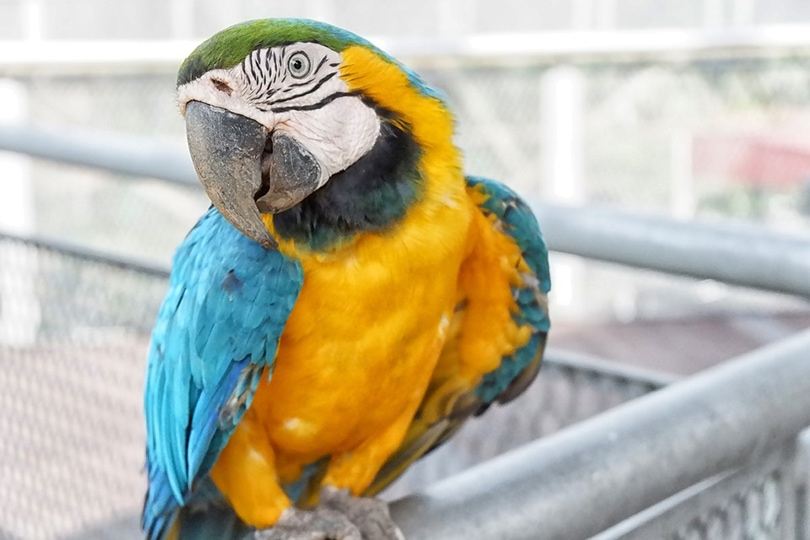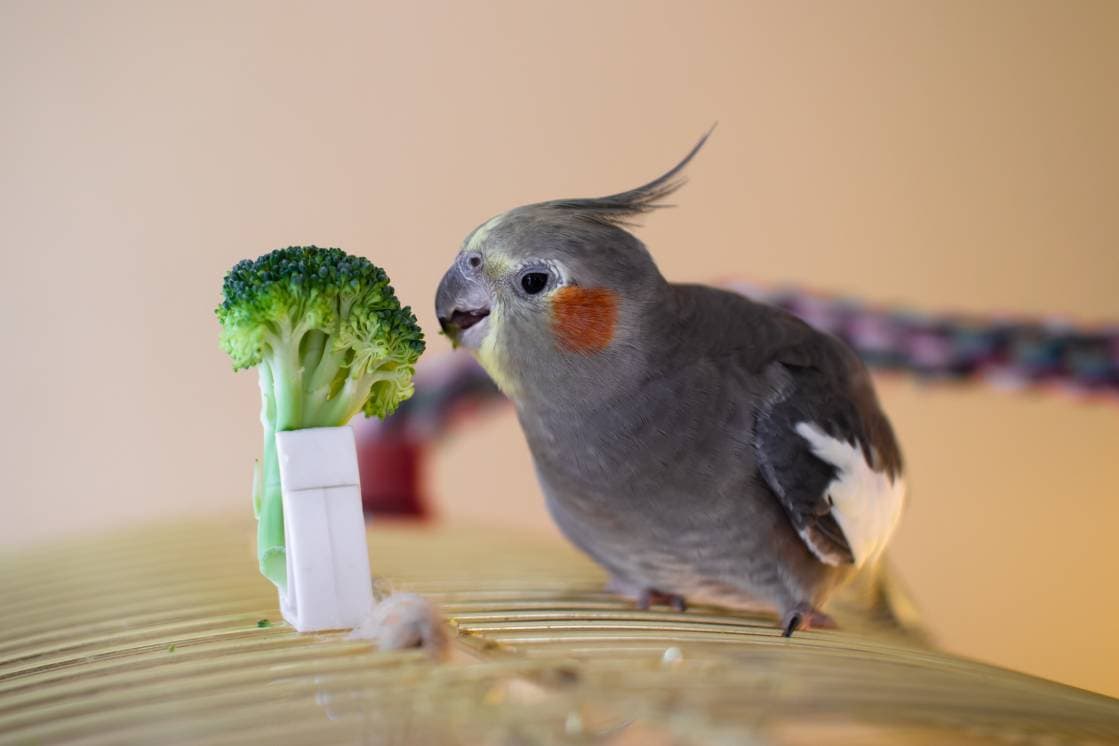
Feather plucking is typically a behavior seen in birds that are increasingly stressed or bored. It is an unhealthy habit that birds pick up to relieve their symptoms. In some cases, feather plucking is normal, and sometimes it is a concerning behavior. Feather plucking can frustrate bird keepers because it can indicate that there is an underlying problem. It also takes a long time for the feathers to heal, and the bird may not look the same after. The new feathers are more vulnerable and can appear whiter than the bird’s overall color.
Feather plucking or chewing is abnormal and should be stopped before it gets worse. It can become a life-long problem unless the root cause is fixed.
What Is Feather Plucking?
This is scientifically referred to as pterotillomania and it is a damaging mental behavior caused by various stressors. It is a maladaptive behavioral disorder that pet birds display by pulling out their feathers or chewing them to the point that they fall out. This is done by their beak and commonly occurs near the tailor on the chest. In some cases, the bird may try to pull out all their feathers except in places that they cannot reach like the head.
The skin and feathers take damage and the habit of feather plucking becomes constant. This behavior is most common in Psittaciformes and about 10% of captive-bred parrots will show this behavior during any point in their life stage. It is the most common inaccessible area of their body like on the neck, chest, back, or ventral wing area. The main feathers at risk of being plucked are contours or down feathers. This behavior is closely related to feather pecking which also causes feather loss and skin damage but is less severe.
This behavior can mimic impulse control disorder (ICD) in humans which is known as trichotillomania. Feather plucking is used by the bird to provide mental stimulation or a form of relaxation. All pet parrots are prone to developing this behavioral problem and some birds are even born with the mental capacity to feather pluck from their parents. The sensation is relished, and plucking can quickly become habitual.

Signs of Feather Plucking
The 7 Causes of Feather Plucking
1. Habitat
If the habitat or cage that your bird lives in is inadequate, they may seek this behavior to relieve signs of boredom and stress. They also gain stimulation by plucking out their feathers because they feel that they have nothing else to do. This is a common problem if the habitat is too small or lacks enrichment like toys.
2. Pain
Birds cannot deal with pain well and they will take to plucking out their feathers in the area that the pain is radiating from. This is partially part of a behavioral problem as they try to cause intentional pain to the affected site in an attempt to further injure themselves and focus on a different type of pain.

3. Behavioral
This is typically the result of boredom, loneliness, or attention-seeking behavior. If a social bird that needs to live in groups of their species is kept alone, then they can develop a feather plucking behavioral problem. Lonely and bored parrots that do not get enough human interaction or toys can also show this problem.
4. Disease
A viral disease, discomfort, endocrine diseases, vitamin deficiencies, and cancer can cause feather plucking. The bird feels unwell and helpless in these cases even if they are getting professional help and medications to treat the different diseases.
5. Toxins
Households contain a lot of toxic substances that can harm a bird. This includes cigarette smoke, lead from rusting metal cages, aerosols, and smoke fumes from a stove or outdoor burner.

6. Allergies
Birds can be allergic to many different things. The allergic reaction can cause itchiness over the skin and cause the bird to scratch or pluck at its feather until it falls out and produces a dry bald patch on its body. Birds are commonly allergic to corn, wheat, rice, maize, or certain foreign household substances.
7. Diet
If birds are fed a low-quality diet, they are prone to developing a range of different health and vitamin deficiency issues. Their skin will be itchy and unhealthy, and their feathers may become brittle and fall out more easily.
The 3 Ways of Treating & Preventing Feather Plucking
1. Provide the Proper Diet
Try and encourage your bird to eat a varied diet of seeds, nuts, pellets, and fresh fruit or vegetables. They should be fed a high-quality diet tailored to meet the dietary requirements of the specific bird that you keep. Avoid foods that cause allergies to your bird and try recommended foods provided by your avian veterinarian.

2. Have a Suitable Habitat and Enrichment
Ensure that the habitat is large enough to comfortably house the size and number of birds in the tank. You should provide enough toys for your bird to chew on and provide toys that provide mental stimulation like mirrors. Always keep social birds in pairs or groups and try to provide daily interaction to prevent boredom.
Keep the cage away from droughts but ensure there is enough airflow. Clean the cage regularly and wipe up any water spillage from their bowl to prevent mold growth.
3. Clean the Cage Regularly
A damp environment is a breeding ground for different bacterial and fungal diseases. The cage should always be kept clean. The substrate should be changed regularly and fresh fruit and veg should be removed after several hours to prevent them from fouling in the cage. Do not smoke near the cage and ensure it is kept away from the kitchen. Avoid spraying aerosols like deodorant or room spray near the cage.
Conclusion
Severe feather plucking should be treated by a professional avian veterinarian. They can also help determine the cause of the feather plucking and help treat it further using medication. If feather plucking becomes an extreme behavior problem in your bird, then you may need to consult with an avian behaviorist who can give you tips and methods to effectively stop your bird from feather plucking.
Featured Image Credit: Brian Upton, Shutterstock










